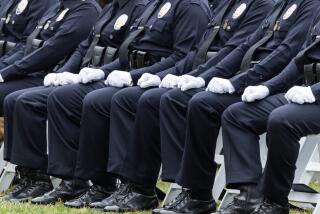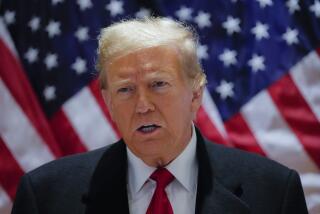Jurors May Not Be Anonymous, Judge Rules : Law: Superior Court decision throws into doubt policies in Downey and Bellflower that kept names of panelists secret.
A Superior Court judge ruled Tuesday that jurors’ names must be made public in a lower-court case in Downey, throwing into question the controversial policies of judges who keep secret the names of jurors in criminal cases.
In a brief order, Superior Court Judge Robert L. Roberson said that the presiding judge of Downey Municipal Court, John David Lord, must reveal the names of panelists in a trial set to begin Sept. 30.
The Los Angeles County public defender’s office had challenged the practice of keeping jurors’ names secret--adopted this year in municipal courts in Downey and Bellflower--arguing that the practice could bias jurors against defendants by suggesting they are dangerous.
State law allows judges to seal jurors’ names at the end of a trial to minimize the possibility of harassment. In his order Tuesday, Roberson said that even if he assumed that law allowed such sealing of names at the beginning of trial, lawyers in the Downey case had not demonstrated a “compelling governmental interest” to justify such confidentiality.
Although the ruling applies only to the one case--in which a man is accused of violating a court order--it immediately prompted Lord and Philip K. Mautino, presiding judge of Los Cerritos Municipal Court, who oversees five courtrooms in Bellflower, to reconsider their use of anonymous juries in all criminal cases.
“My procedure is exactly the same as the one used in Downey and now the court says the procedure is illegal,” Mautino said. “If I continue to use it anyway, then we could find ourselves with every criminal conviction being reversed, and that would be an unconscionable result.”
Mautino said he would study the decision to see if it might allow continued juror anonymity as long as a judge found a “compelling governmental interest” to justify it in each case.
Lord said he will consult the county counsel’s office, which defended both judges’ right to use unidentified panels, to see whether a quick appeal can be made to the 2nd District Court of Appeal.
In January, Lord began keeping all jurors’ names secret in his courtroom from the start of criminal trials, asserting that it was the only way to give jurors meaningful anonymity.
At the same time, Mautino adopted the policy in all his courts in Bellflower. The use of anonymous juries there also sparked an appeal to Superior Court--which acts as an appellate court for municipal court disputes--but the Bellflower case that was appealed became moot when it was dismissed in the trial court for other reasons.
More to Read
Sign up for Essential California
The most important California stories and recommendations in your inbox every morning.
You may occasionally receive promotional content from the Los Angeles Times.









